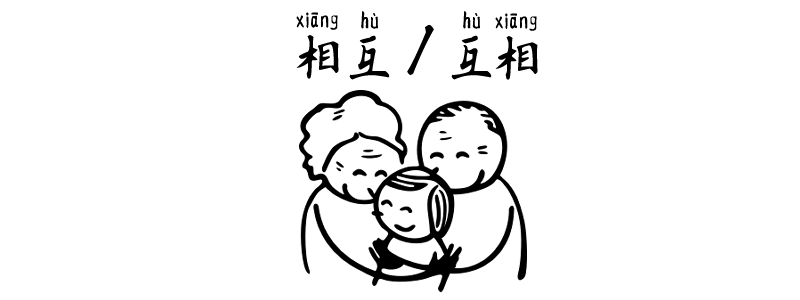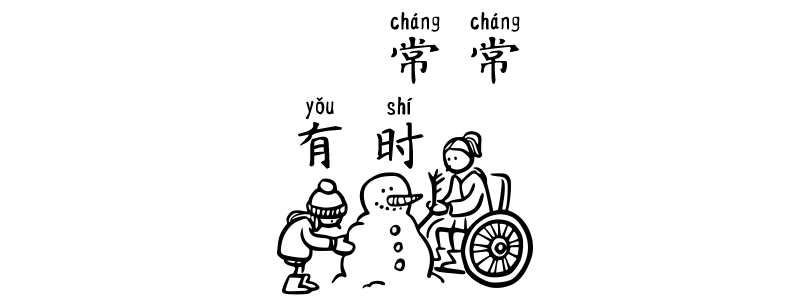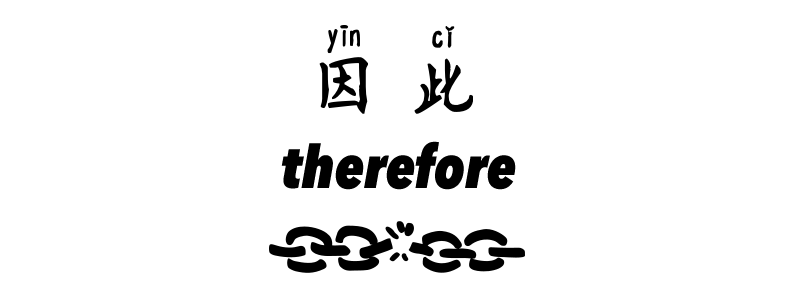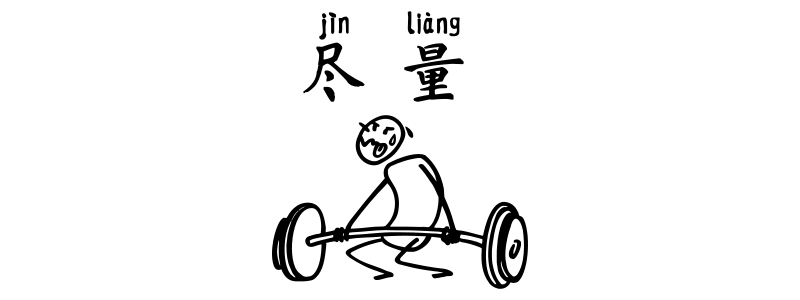Lesson 5 A:這是你爸爸媽媽的相片嗎? B:是啊。 A:你爸爸是老師嗎? B:對,他是英文老師。 A:這張呢?這是你哥哥還是你弟弟? B:是我哥哥,我沒有弟弟。 A:這兩個女孩子都是你姐姐嗎? B:不,這個是我姐姐,那個是我姐姐的朋友。 A:你家有幾個人? B:我家有五個人。 A:你們家的書真不少,這些都是你爸爸的嗎? B:有的是我爸爸的,有的不是。 王大文:爸爸,這是我朋友。 李東尼:王伯伯好。 王先生:好,大文,你這位朋友叫什麼名字? 王大文:他的中文名字叫李東尼,他的中文很好。 王先生:東尼,你是哪國人? 李東尼:我是美國人,可是我媽媽是台灣人。 Lesson 6 A:請問,先生,您要買照相機嗎? B:是啊,我的照相機太舊了,我想買一個新的。 A:您喜歡哪國貨? B:我都看看,好嗎? A:這個是德國貨,您覺得怎麼樣? B:這個太大了,我喜歡那個小的。 A:這個小的很好,是日本貨。 B:多少錢? A:五千塊。 B:太貴了,你們有便宜的沒有? A:這個美國的相機也很好,只賣一千五百塊。 B:好,我買這個。 A:你們大學有多少學生? B:有兩萬多學生。 A:有多少老師呢? B:我不知道。我想有兩千多位。 A:那真不少。 B:你們學校大不大?有多少學生? A:我們大學很小,只有七、八千學生,可是很有名。
Author: tiffany
Seasonings in Chinese
Are you ready to learn about Chinese seasonings and make your Chinese dishes taste amazing? Authentic Chinese cuisine is famous for its delicious flavors, thanks to its special sauces and seasonings. In this blog post, we’ll explore the most common seasonings used in Chinese cooking. Whether you’re a skilled chef or new to the kitchen,…
Each other – hùxiāng and xiānghù
Grammar Point:互相 hùxiāng and 相互 xiānghù are two Chinese expressions that are used to convey the idea of “each other” in English. While they are similar in meaning, there is a slight difference in their usage and placement within a sentence. Structure 互相 hùxiāng + V 互相 hùxiāng is an adverb and it typically focuses…
的 de Phrase With An Omitted Noun
<的 de> 的 de is a noun modifier that can be used to indicate possession or link an adjective or verb phrase to a noun. V / Adj. / N+ 的 + N Tiffany 的de狗gǒuTiffany 的de狗gǒuTiffany’s dog (N + 的 + N) 可愛kěài的de狗gǒu可爱kěài的de狗gǒuCute dog (Adj + 的 + N) 我wǒ畫huà的de狗gǒu我wǒ画huà的de狗gǒuThe dog I draw (V + 的…
視聽華語 Book 1 Lesson 3 – 4
Lesson 3 A:你喜歡看電影嗎? B:很喜歡,你呢? A:電影、電視,我都喜歡看 B:你喜歡看什麼電影? A:我喜歡看美國電影,你呢? B:美國電影、中國電影,我都喜歡 A:你也喜歡看電視嗎? B:電視,我不太喜歡看。 A:你有汽車沒有? B:沒有。 A:你要不要買汽車? B:我要買。 A:你喜歡哪國車? B:我喜歡美國車。 A:英國車很好看,你不喜歡嗎? B:我也喜歡,可是英國車太貴。 Lesson 4 A:先生,您要買什麼? B:我要買筆? A:我們有很多種筆,您喜歡哪種? B:這種筆很好看,多少錢一枝? A:七塊錢一枝,您要幾枝? B:我要兩枝,兩枝多少錢? A:兩枝十四塊錢。 B:我沒有四塊零錢,我給你二十塊錢,請你找錢,好嗎? A:好,找您六塊,謝謝。 A:小姐,您要買什麼? B:我要一個漢堡和一杯可樂,一共多少錢? A:漢堡一個三十八塊,可樂一杯十九塊,一共五十七塊錢。 B:這是六十塊錢。 A:謝謝,找您三塊。
視聽華語 Book 1 Lesson 1 – 2
Lesson 1 李先生:先生,您貴姓? 王先生:我姓王,您貴姓? 李先生:我姓李,叫大衛。 王先生:李先生,您好。 李先生:您好。您是美國人嗎? 王先生:不是,我是英國人。 李愛美:你好。 王珍妮:你好。 李愛美:我叫李愛美。你叫什麼名字? 王珍妮:我叫王珍妮。 李愛美:珍妮,你是哪國人? 王珍妮:我是美國人,你呢? 李愛美:我是台灣人。 Lesson 2 趙小姐:張先生,您早。 張先生:早,趙小姐,好久不見,你好啊! 趙小姐:很好,謝謝。您好嗎? 張先生:我也很好。這是我太太。淑芳,這是趙小姐。 趙小姐:張太太,您好。 張太太:您好,趙小姐。 李愛美:珍妮、大衛,你們好。 王珍妮:你好,愛美。 李愛美:天氣好熱啊! 張大衛:是啊! 李愛美:你們很忙嗎? 王珍妮:很忙。你呢?忙不忙? 李愛美:我不太忙。你們去上課嗎? 王珍妮、張大衛:是啊,再見。 李愛美:再見。
Adverbs: 常 cháng – usually
Structure S + 常常 chángcháng + VO 常常 chángcháng (often, usually) refers to a behavior or action that occurs frequently and with short intervals between occurrences. Therefore, it cannot be used in the negative form. Also, unlike in English, frequency adverbs in Chinese are typically not placed at the end of sentences. 我wǒ常常chángcháng覺得juéde他tā很hěn笨bèn我wǒ常常chángcháng觉得juéde他tā很hěn笨bènI often think…
“Therefore” in Chinese – yīncǐ
Grammar Point:The Chinese word 因此 yīncǐ is a conjunction that is often used to indicate a logical consequence, inference, or conclusion. It is similar in meaning to the English phrases “as a result” or “therefore,” and it is commonly used in formal writing. Structure Cause + 因此 yīncǐ + effect 我wǒ太tài累lèi了le, 因此yīncǐ决定juédìng早點zǎodiǎn上床shàngcháig睡覺shuìjiào我wǒ太tài累lèi了le, 因此yīncǐ决定juédìng早点儿zǎodiǎnr上床shàngcháig睡觉shuìjiàoI’m too tired,…
As much as possible – jǐnliàng
Grammar Point:The term 儘尽量 jìjǐnliàng in Chinese serves as an adverb and is used to convey the idea of “as much as possible” or “to the greatest extent.” It is often used in various contexts to indicate a strong effort to maximize or optimize something. Structure In China, you might come across the word “儘尽量”…
Spices & Herbs in Chinese
Spices and herbs play a big role in Chinese food, adding all sorts of yummy flavors and smells. Imagine the spicy tingle of Sichuan peppercorns or the nice smell of star anise. In this article about ‘Spices & Herbs in Chinese,’ we’ll dig into the interesting things about these ingredients and how they make Chinese…







